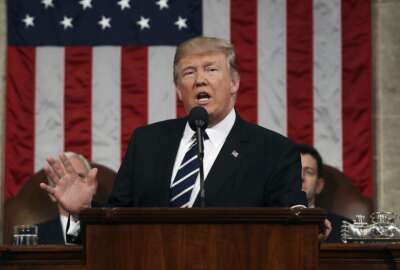
18 down, 35 to go: White House begins to pick up pace on Defense political nominations
The Senate has confirmed six officials to serve in Pentagon leadership positions within the past month. But for 35 of DoD's 53 politically-appointed jobs, there...
After a period of several months in which James Mattis was the Trump Administration’s sole political appointee in the Pentagon, the nomination and confirmation process for Defense Department nominees finally appears to be picking up a bit of steam, and Mattis says more nominations are on the way.
As of this time a month ago, only five prospective Defense officials were even in the confirmation process. But since then, the Senate has confirmed David Norquist as the DoD comptroller and chief financial officer, Elaine McCusker as his principal deputy, Heather Wilson as the secretary of the Air Force, Kari Bingen as the principal deputy undersecretary for intelligence, Kenneth Rapuano as assistant secretary for homeland defense, and Robert Story Karem as assistant secretary for international security affairs.
And this week, the Senate will hold confirmation hearings for Richard Spencer, Trump’s latest pick for secretary of the Navy and Patrick Shanahan, the nominee for deputy secretary of Defense. Shanahan’s confirmation would pave the way for the belated retirement of the current deputy, Bob Work, one of only a handful of holdovers from the Obama administration.
Also, on Friday, the president announced his intent to nominate John H. Gibson as DoD’s deputy chief management officer, a job that’s due to be elevated to the new position of chief management officer under legislation that takes effect next February. Gibson is the former president and CEO of XCOR Aerospace, a firm that makes space launch systems.
Still, several of the Pentagon’s most senior positions remain open. There’s no publicly-announced candidate for any of the other four undersecretary jobs, nor for secretary of the Army. According to a nomination tracker maintained by the Partnership for Public Service, out of the 53 DoD slots requiring Senate confirmation, the White House has only nominated or announced nominees for 18. The absence of politicals is perhaps most evident in the world of acquisition: there have been no nominees even announced for any of the eight acquisition-related jobs that require Senate confirmation in DoD and the military services.
Responding to senators’ questions about the slow nomination process during a hearing last week, Mattis said the situation is not as dire as it seems, and appeared to place at least part of the blame on the Senate’s own vetting requirements.
“There’s a lot more people in process, but the Senate Armed Service Committee puts extraordinary attention to the ethical requirements to be there,” he said. “Probably the most challenging ethical standard is removing even the appearance that someone could have a conflict of interest. Part of this is simply people having to divest of finances. I was in the Marines for 40 years – I’m pretty boring when it comes to my economic situation – and it took me an accountant and a lawyer and a thick stack of paper to show that I didn’t have ethical conflicts. So it is a challenge, but we do end up with some varsity level draft picks.”
In fairness to the Senate however, the famously-deliberative body has been relatively quick in confirming Defense officials after it receives them from the White House. The longest confirmation process so far – for Norquist – took seven weeks from the time the Senate officially received the nomination until it voted for final confirmation, and two of them have been wrapped up within a month.
Copyright © 2025 Federal News Network. All rights reserved. This website is not intended for users located within the European Economic Area.
Jared Serbu is deputy editor of Federal News Network and reports on the Defense Department’s contracting, legislative, workforce and IT issues.
Follow @jserbuWFED
Related Stories

Caretakers serve in key DoD posts while Trump assembles Defense team




